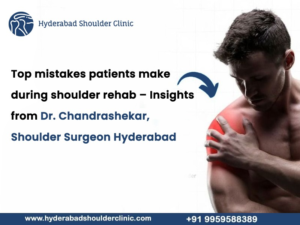Frozen shoulders can be very troublesome. It is also known as adhesive capsulitis. Even simple shoulder movements become difficult for patients with a frozen shoulder.
Pain is the primary symptom of a frozen shoulder, and you may experience it while moving your arm, even when performing simple tasks like buckling a seatbelt and washing your hair. The condition is commonly caused by scarring of the shoulder capsule that lines the shoulder joint.
Key Points to Know about Frozen Shoulder Surgery
- Arthroscopic shoulder surgery is commonly used to treat a frozen shoulder.
- Surgery is recommended when non-surgical methods do not provide relief from frozen shoulders.
- During frozen shoulder surgery, several incisions are made to repair the area by inserting small surgical instruments through the incisions.
- Recovering from frozen shoulder surgery can take up to three months, and in some cases, it may take even more time.

The minimally invasive Arthroscopic shoulder surgery is used to diagnose and repair the frozen shoulder. The recovery time for arthroscopic surgery for a frozen shoulder is typically shorter than after an open procedure. Surgery usually relieves patients’ symptoms; however, complete recovery is longer.
Risks associated with frozen shoulder surgery
The arthroscopic procedure used to treat frozen shoulders is usually safe, but in some rare cases, complications might occur. The doctor will discuss with you about risks and benefits before you decide to undergo the procedure.
Complications may include:
Pain – an inevitable part of any operation. Doctors will do their best to ease your pain. As part of pain management, you will be prescribed certain pain medications, and you should take them as told.
Bleeding – the possibility of bleeding is <1% during or after arthroscopic shoulder surgery. The need for blood transfusions is very rare.
Infection – Any surgical procedure is associated with some risk of infection. Similarly, in the case of arthroscopic surgery for treating frozen shoulders, they tend to develop Staph and Strep bacterial infections. It is estimated that less than 0.2% of arthroscopic repairs are infected. However, doctors suggest taking antibiotics to prevent these infections.
Nerve injury – Several nerves surround the shoulder joint. In rare cases, these nerves might get damaged while performing shoulder surgery.
Chondrolysis – It is a rare but severe complication that usually occurs following surgery. Chondrolysis can lead to joint arthritis. Chondrolysis is rare, but there’s a possibility of permanent damage to a young person’s shoulder if it occurs after they suffer an athletic injury.

Injury to the head and neck – The shoulder joint is very close to the head and neck. So in some rare instances, the head and neck might be injured. However, your shoulder surgeon and anesthesiologists will take necessary precautions to protect the head and neck during the procedure.
Unsightly scarring – The chances of unpleasant scarring on the skin is <1%. Most of the time, surgical scars dissolve and look like a thin pale line after one year following surgery. However, if your scar bothers you, many treatments improve the scar. The scars from arthroscopy are very small, almost invisible.
Blood clots – The overall risk of blood clots is 0.2% with shoulder surgery.
To reduce the risk of blood clots, surgeons use different methods like calf compression pumps. The risk increases with people who are obese, elderly and smoking.
Other rare complications include heart problems, breathing problems, blood pressure problems, stiffness, shoulder instability, fracture, tendon damage, muscle failure, and the need to undergo revision surgery.
Read: How Is Frozen Shoulder Treated?
Preparation for frozen shoulder surgery
Before you have arthroscopic surgery for your frozen shoulder, the surgeon will talk to you about the procedure and what to do before and after the procedure. This may include:
- You should quit smoking a few weeks before surgery and a few months after surgery.
- The same with alcohol consumption, you should limit it.
- Before surgery, you should let your doctor know if you are suffering from a fever, cold, or any other illness.
- The hospital stay is very short, and you may be discharged on the same day of surgery. So, arrange for someone to take you home following surgery.
- Think about hiring a health care nurse or moving to a rehab facility if you live alone after surgery.

Recovery from frozen shoulder surgery is often a slow process. This can take anywhere from eight to twelve weeks. Follow your physical therapy routine carefully to return to your normal activities as quickly as possible.
Most patients find relief from pain and increased shoulder mobility after surgery. Recurrence of frozen shoulder may happen in some rare cases, especially in people having diabetes. Contact Dr Chandra Sekhar, leading shoulder surgeon in Hyderabad, to know details about frozen shoulder treatment or any concerns about any other shoulder problems. He has more than 15 years of experience providing both surgical and non-surgical treatment for shoulder problems.





